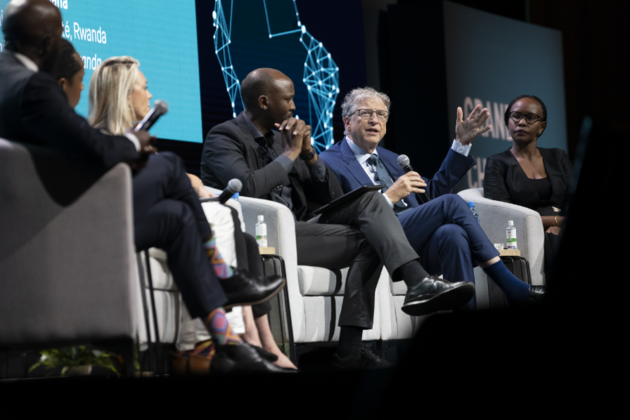
Photo/Courtesy of Gates Foundation
A bus travels through the city center of Dakar, the capital of Senegal. It slowly winds its way through a string of secondhand cars. Street vendors hawk small goods and snacks to drivers stuck in traffic. In the center of a roundabout on the outskirts of town, bare sand is exposed, and shepherds are driving sheep to graze. After about half an hour, the bus arrives at a wide-open area. The grass is lush and green, thanks to the moist sea breeze from the Atlantic Ocean. Our destination for this trip is the Abdou Diouf International Conference Center, located in this undeveloped "development zone."
The topic of conversation inside the conference center—the hottest technology of the moment, generative AI—seems out of place in the surrounding environment. AI is rapidly evolving, but it still seems very far away from Africa.
On October 28, "AI godfather" Geoffrey Hinton claimed that tech companies plan to increase the computational scale of large language models (LLM) by 100 times in 18 months. For this reason, he and two other Turing Award winners—Joshua Bengio and —issued a joint statement calling for regulation in an era of rapid AI development.
"If managed carefully and distributed fairly, advanced AI systems could help humanity cure diseases, elevate living standards, and protect our ecosystems...(if not)AI could cement or exacerbate global inequities," they warned.
It is with the same hope and concern that the Bill & Melinda Gates Foundation (Gates Foundation) chose Dakar, the capital of Senegal at the westernmost tip of Africa, as the venue for its 2023 Grand Challenges Annual Meeting in October. The focus was on the benefits of generative AI for global health and development.
"Efficiency Increased 50 Times, 60 Books in 3 Months"
"Can you believe it? Over 90% of people in Mali never use the language they learned in school in their daily life," said Michael Leventhal, explaining the initial motive of developing indigenous language textbooks for Africa.
Mali is the second largest country in West Africa and was once a French colony. After independence in 1960, French remained the language of education and officialdom, while Bambara, spoken by the locals, is a minority language with an incomplete writing system. Leventhal, an American who had worked in Silicon Valley for many years, came to Mali for a short-term teaching and was touched by the lack of educational resources in the country. He eventually settled down and made promoting the teaching of Bambara his new life goal.
Leventhal, with a technical background, has worked for semiconductor giant Micron. He is not unfamiliar with cutting-edge technology. Three months ago, after receiving a $100,000 grant from the Gates Foundation, he quickly took action to explore using generative AI in education.
Leventhal told NBD that one of the major difficulties of Bambara language teaching is the lack of reading materials. Generative AI can play a big role in this area. His team inputs the idea of a story "seed" in English or French into GPT-4, and then lets it fill in the content. The story is then translated into Bambara. They then use Stable Diffusion's text-to-image technology to add vivid illustrations to the story, creating a picture book with both text and images.
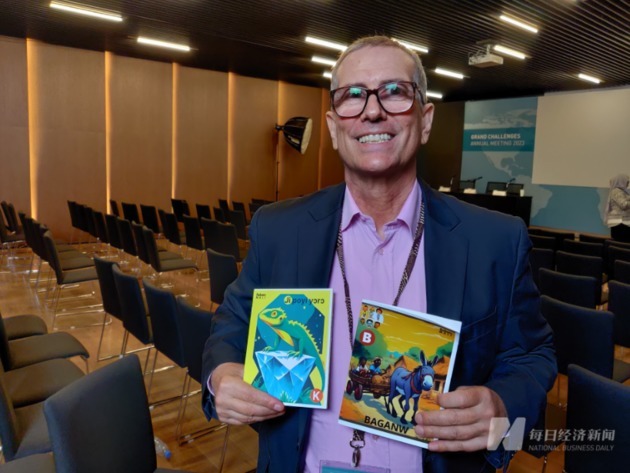
Leventhal and his Bambara Book Photo/Li Menglin (NBD)
“I really like reading Chinese novel Dream of the Red Chamber, so I asked ChatGPT what plots in the book would be interesting to African children. Then, we started from that point and developed a whole story,” Leventhal told NBD. In just three months, Leventhal’s team has already produced 60 books. He said, “These things are not that humans can’t do, but AI has improved efficiency by 50 times. You should know that the African language children’s book project funded by the World Bank can only write 20 books a year.”
These storybooks have been tested in many community centers and schools, and children enjoyed reading them. Recently, the national language policy committee of Mali discussed how to improve on the country’s 65% illiteracy rate. They have already expressed interest in ordering 500,000 storybooks from Leventhal as teaching materials.
Similar to Leventhal’s project, nearly 50 AI projects from middle- and low-income countries each received a $100,000 grant, covering areas such as healthcare, education, agriculture, and finance. Many project developers told NBD that large AI models can save manpower and material resources, and reduce the technical barriers, which is essential for regions with limited resources.
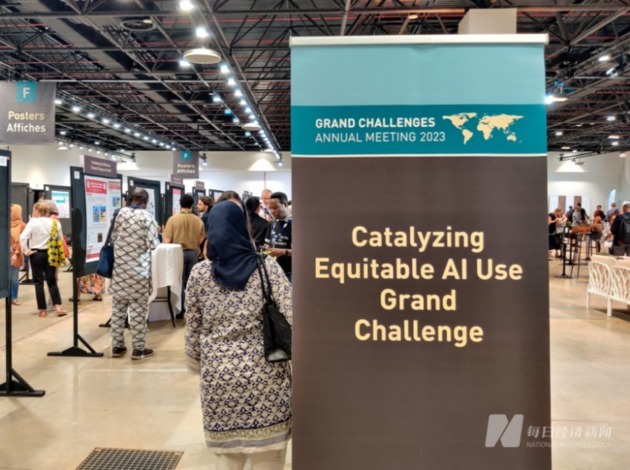
People from 50 different funded programs networking at Grand Challenges Annual Meeting 2023 Photo/Li Menglin (NBD)
Theofrida Maginga, an assistant lecturer at Sokoine University of Agriculture in Tanzania, was originally studying the use of Internet of Things (IoT) technology to monitor early signs of maize disease. Now, her team has developed a chatbot using ChatGPT technology that can provide timely diagnostic advice and solutions for maize diseases to smallholder farmers with low literacy levels. The importance of this guidance is clear for local farmers who rely on maize for half of their income.
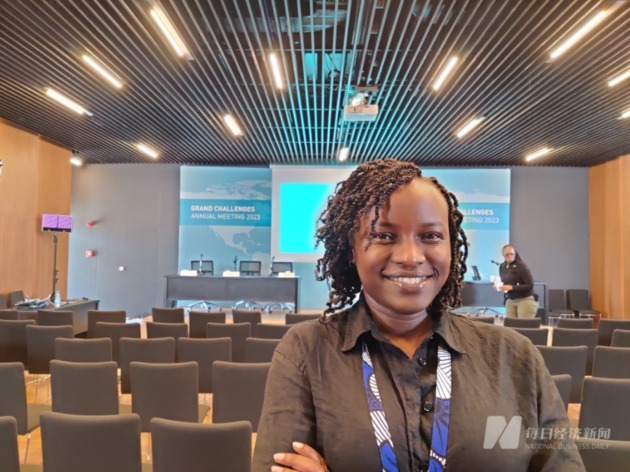
Theofrida Maginga Photo/Li Menglin (NBD)
The most important thing is that this tool can be used directly in WhatsApp. Users only need to add an account, without the need to install a separate app. In addition, the tool supports voice input and output in Swahili, the local language.
"Our goal is to help farmers make decisions in the simplest way possible," said Maginga. "Farmers feel that this is really their technology, and we hope it can become a part of their everyday life."
Scott Mahoney of the South African Health Foundation is impressed by the ability of large language models to process large amounts of text. Each year, the World Health Organization (WHO), medical research associations, and health departments around the world publish a large amount of medical evidence. This evidence needs to be analyzed by humans to form clinical guidance, which is a time-consuming and labor-intensive process.
"High-income countries have many commercial medical evidence, but the subscription fee is $250 to $500 per year, which is equivalent to 5% to 10% of the annual salary of healthcare workers (in developing countries)," said Mahoney. "On the other hand, it takes 10 to 17 years for clinical evidence to be applied to clinical practice. Accelerating this process could change the fate of many patients."
Mahoney's team hopes to use GPT-4 and the Microsoft Azure machine learning platform to extract practical recommendations from these documents to help healthcare workers make decisions. They have already experimented with over 180 pages of WHO documents and found that the results of the machine can be 90% overlapping with those of a professional editorial team, showing the potential of this approach.
Everyone in Silicon Savannah is looking at LLMs
In November 2022, shortly after ChatGPT was released, a news report in Time magazine drew the world’s attention to Kenya. According to the report, OpenAI hired outsourced data labelers in Kenya with low wages, long working hours, and mental stress.
However, Kenya's tech startup atmosphere is at the forefront of Africa. The tech hub in the capital, Nairobi, even has a reputation as "Silicon Savannah." The explosion of LLMs has allowed local startups to see industry opportunities.
“Kenya is an important gateway to Africa, with a young population, a large developer community that is still growing rapidly. Large language models represent an exciting moment that could fundamentally change many business strategies,” said Juliana Rotich, the head of fintech at African mobile payment app M-Pesa, to NBD.
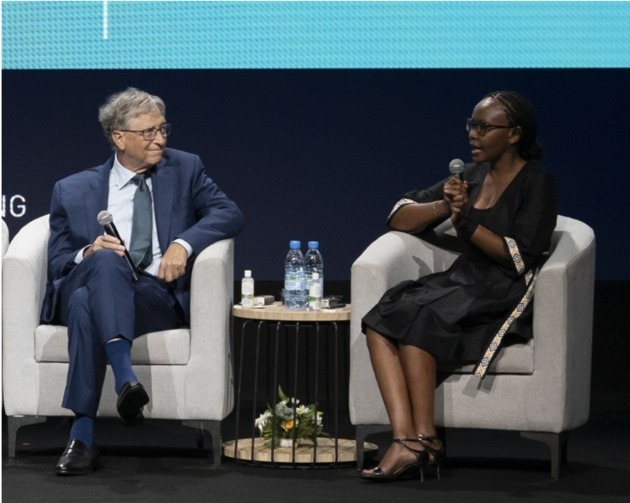
Bill Gates is talking with Juliana Rotich
Photo/Li Menglin (NBD)
Rotich is a leading figure in the Kenyan technology industry. The open-source disaster information software Ushahidi, which she co-founded, has been adopted by developed countries such as New Zealand and Japan. In Nairobi, she co-founded the incubator space iHub, which has become a base for local entrepreneurs.
Tonee Ndungu, also from Nairobi, is also a veteran entrepreneur. He has founded incubator centers and is the founder of Kytabu, an education technology company. Compared to other funded projects, his project is much more mature: ChatGPT is introduced into the existing K-12 education software to provide personalized learning assistance for students of different grades.
“Every startup in Nairobi is looking at the opportunities brought by LLMs. Whether you are in the health industry, education, or insurance, you need personalized services, and AI can provide faster and cheaper personalized services. This is a watershed moment,” Ndungu told NBD.
In Ndungu's view, Kenyans have always been advocates of technology, and Kenya's smartphone penetration rate is already very high. The market has the potential to explode, and LLMs have lowered many barriers to the development of functions, which is exactly what Kenyan technology companies need.
Just a few days before Ndungu came to the Grand Challenge meeting, Amazon Web Services (AWS) opened a new office in Nairobi. Kenya passed a data protection law in 2022 that strictly restricts the storage of data of its citizens overseas. "With AWS, entrepreneurs can legally collect data. With open-source LLMs, we can make many localized improvements," Ndungu said.
Promising but still a lot to be done
Caroline Govathson, a South African HIV prevention specialist, is working on a new app that uses a large language model to assess HIV infection risk. The app is designed to address the shortage of healthcare workers in South Africa and to make it easier for people who fear the stigma of HIV.
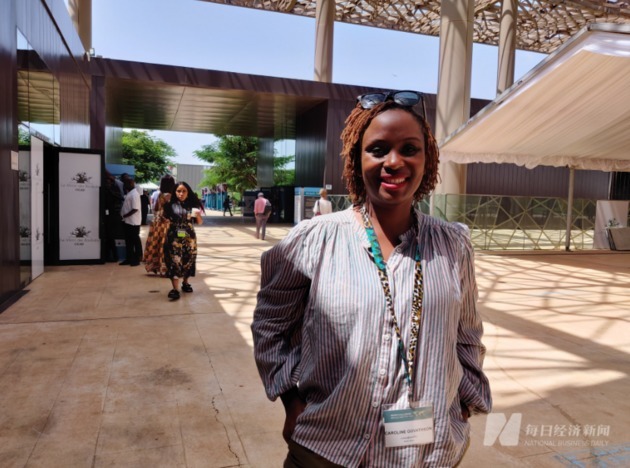
Caroline Govathson Photo/Li Menglin (NBD)
"I see the huge potential of AI, and everybody is saying the same, " Govathson told NBD, "but there is still a lot of work to be done."
It is true that many participants were optimistic about AI large models. However, many projects are still in the proof of concept or pilot stage, and many shortcomings have already been exposed.
The most pressing issue is poor localization. After all, the language data on the internet is still dominated by English and other dominant languages. The perspectives of small languages from middle- and low-income countries are quite scarce, and AI-generated content often does not fit with local culture and sometime is even offensive.
Leventhal, who is compiling Bambara language textbooks, fully agrees with this point. For example, he wanted ChatGPT to write a story about Africa, but the content the system provided was more like a fantasy novel written by Europeans, which is the imagination of Africa by foreigners, far from reality.
Govathson also said that many Africans have limited text input skills and are not familiar with smart devices. They can only rely on voice input and output. To ensure the accuracy of the consulting, it is necessary to sort out how to make the models more familiar with local slangs.
In addition, although the generation capabilities of large models can replace a lot of manpower, it still takes some effort to use them effectively.
“I have been writing code all my life, and I can say that writing prompts is harder than writing code. First, you need to understand the mechanism of this system, and you also need to be familiar with Mali culture, understand linguistics and pedagogy. It can be very interesting for ordinary people to play with ChatGPT, but to get high-quality results, you still need experts,” Leventhal said.
Tonee Ndungu's educational software is not simply introducing ChatGPT, but needs to be trained and fine-tuned with its own data, which puts higher demands on talent and computing power. “Intellectual resources are a major challenge. The development of the product is very difficult, and we had to go to Europe to recruit talent,” Tonee Ndungu said. “On the other hand, the content that children learn must be accurate, and ‘hallucinations’ must be prevented. Therefore, our project needs to be tested, and the price of running a test is as high as $4,000, which is very expensive.”
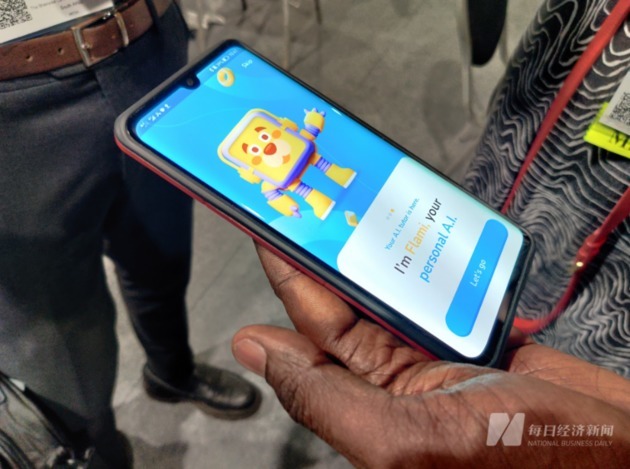
Educational Software shown by Tonee Ndungu Photo/Li Menglin (NBD)
Mahoney from South Africa is optimistic, believing that the evolving AI technology can solve many problems: "Of course, LLMs still have many limitations, but we also need to see the reality of the development of LLMs. The difficulties three months ago may have completely disappeared today, which may be through fine-tuning of the model or improving the response speed of API.”
Perhaps it is precisely because of the difficulties reported by different projects, Bill Gates announced that the Gates Foundation will invest $30 million to support the establishment of an AI platform in Africa, providing technical and operational support to African scientists and entrepreneurs, such as data storage support. In addition, these funds will also help promising projects enter the next stage.
“We are very lucky to have received (the first round of) funding, and we are working very hard. Even without further funding, these AI-generated textbooks can be used for a long time, even forever,” Leventhal told NBD.


 川公网安备 51019002001991号
川公网安备 51019002001991号





